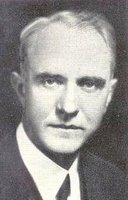That Breckinridge Boy

Henry S. Breckinridge, a hale and hearty scion of an illustrious American family who pops up as a footnote in a lot of unlikely places, was born on this day in 1884 in Chicago, Illinois.
A member of the famous Kentucky Breckinridge clan (his great-grandfather, John, was a U.S. senator and attorney general; his second cousin, once removed, John C. Breckinridge, was U.S. vice president; his uncle, William C.P. Breckinridge, was a rather notorious congressman; and his cousin, Sophonisba, was a Hull House reformer), Henry Breckinridge's appearance at the birthday party of President Benjamin Harrison's grandson while still a youngster was considered noteworthy fodder for the Washington Post society pages.
After attending Princeton and Harvard Law School, without relevant experience Breckinridge was appointed Assistant Secretary of War by President Wilson in 1913, and shortly thereafter was charged with personally delivering $3 million in gold to Europe, to be provided to U.S. citizens stranded in Europe at the outset of World War I. He resigned in 1918 with Secretary of War Lindley Garrison over Wilson's failure to create a reserve force, and served briefly in the U.S. Army in World War I, seeing action as a battalion commander at Vosges, St-Michel and the Meuse-Argonne. After the War, Breckinridge won a bronze medal at the 1920 Olympics as a member of the men's fencing team, in the foil competition, and served as captain of the men's team in the 1928 Olympics.
As a practicing lawyer, Breckinridge represented Charles Lindbergh and acted as his intermediary in the unsuccessful negotiations for the release of Lindbergh's kidnapped child Charles, Jr. in 1932. He was, in fact, the first person Lindbergh called when he realized his infant son was missing, and he later served as a witness in Bruno Hauptmann's trial for the murder of the Lindbergh baby.
In the wake of the tragic crash of the Akron airship off the New Jersey coast in 1933, Breckinridge served as counsel to the joint congressional committee to investigate dirigible disasters -- not a coincidence, perhaps, since his then wife (second of three), Aida de Acosta, was the first woman to pilot a dirigible back in 1903.
He subsequently flirted with electoral politics as an anti-New Deal Democrat, running for Senate from New York as a Constitutional Party candidate in 1934 and entering Democratic presidential preference primaries against President Roosevelt in 1936 before supporting Alf Landon in the general election. Unlike his friend, Col. Lindbergh, however, Breckinridge was a quick supporter of stemming the tide of Nazism in Europe, declaring, "If Hitler makes one move to touch Iceland or Greenland, the United States should immediately occupy them and loose its sea and air power upon the Nazi bandit whose victory would mean the end of all civilized freedom in the world."
Breckinridge died on May 2, 1960 in New York City.
Labels: Air and Space, American Politicians, Juris History, Legal History, Presidential Campaigns





0 Comments:
Post a Comment
Subscribe to Post Comments [Atom]
<< Home